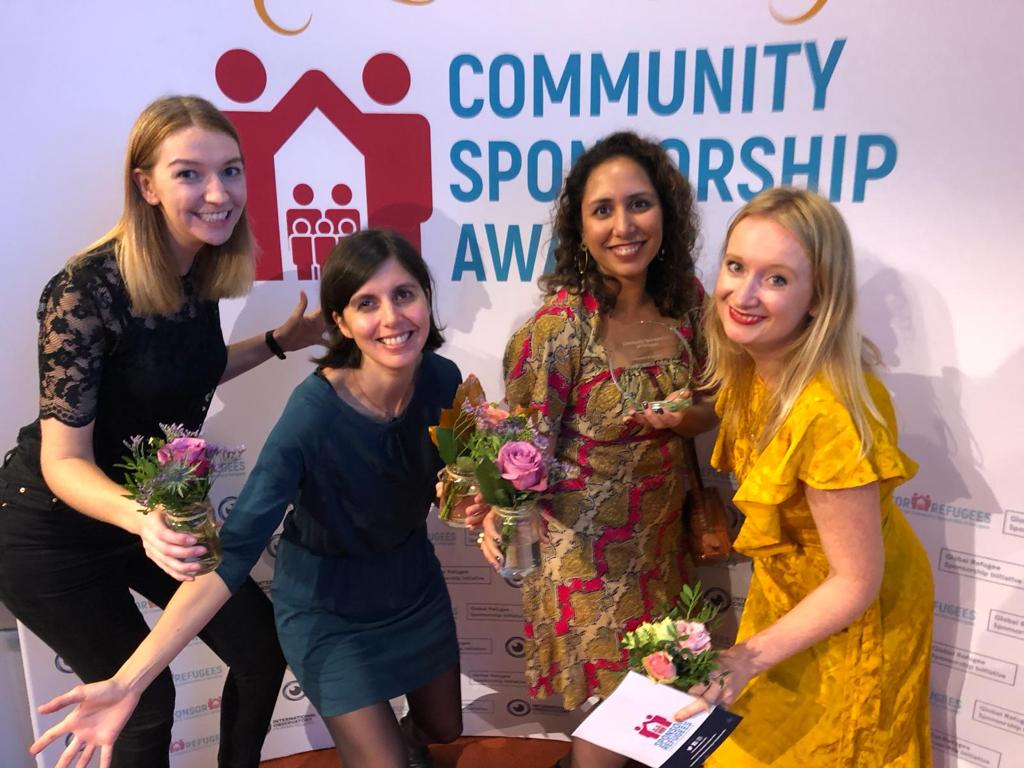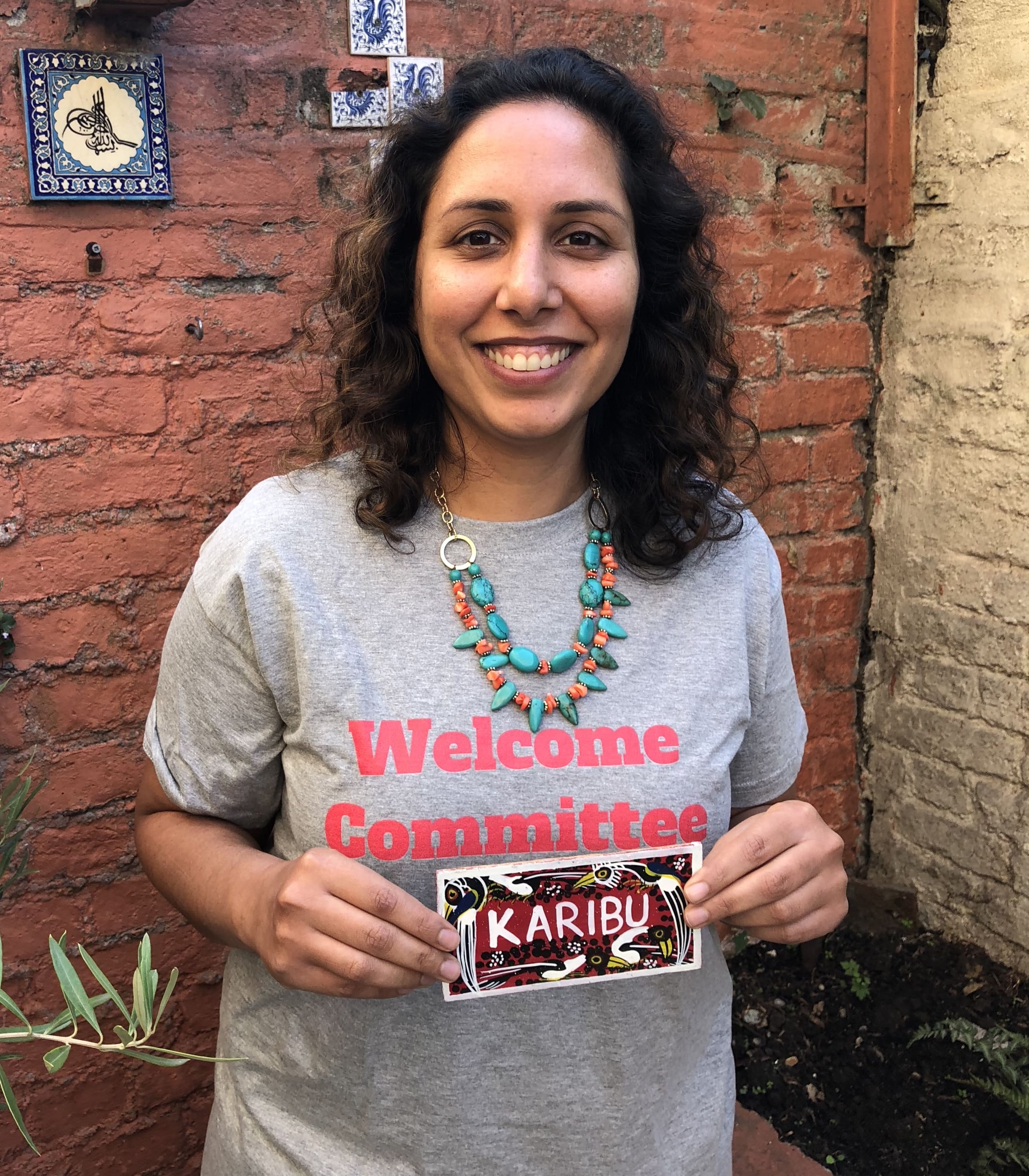Over the past several months, Migrants Organise has been supporting a group of London-based volunteers known as the Welcome Committee, in preparing to resettle a refugee family via the government’s Community Sponsorship scheme.
An innovative approach to refugee resettlement, the initiative gives everyday people the opportunity to unite and play a leading role in welcoming a refugee family into their community. Being a Community Sponsor involves everything from meeting the refugee family at the airport, to finding them accommodation and providing practical support as they adjust to their new lives in the UK.
Khairunissa Dhala, a refugee and migrant rights researcher at Amnesty International and one of the founders of the Welcome Committee, was recognised last week at the first-ever Community Sponsorship Awards run by Sponsor Refugees/Citizens UK. As she and other members of the Welcome Committee prepare to welcome a refugee family to London, Khairunissa tells us about her experiences and motivations – and provides advice for others considering getting involved in Community Sponsorship.
Congratulations Khairunissa on winning Volunteer of the Year at last week’s Community Sponsorship Awards! Can you tell us a little about yourself and how you got involved in Community Sponsorship?

I grew up in Tanzania, but have been living in London for 15 years, where I work as a researcher on refugee rights. Recently I’ve been looking at the struggles refugees from Syria experience in Lebanon and Jordan. Many refugees live in dire situations, in what are already poor countries. Many of the problems they face could be alleviated if richer countries pulled their weight.
With this in mind, in 2014, my colleagues at Amnesty International launched the Open to Syria campaign, which eventually developed into a global campaign to increase refugee resettlement. Community Sponsorship here in the UK can play a key role in this effort.
Since most of my work with refugees takes place in other countries, I had been wanting to get involved with my local community here in London. With a group of Syrians and other people who have worked in Syria and with refugees, I helped start the Marhabtayn Syrian Supper Club, where we celebrate Syrian food and culture, show solidarity with people affected by the Syrian conflict, and stand up to negative news stories about refugees. We also raise money to provide small grants to displaced Syrians in need.
However, we all felt that we could do more to help, so we discussed the idea of Community Sponsorship at one of our supper clubs. With my colleagues Charlotte and Abigail, we decided to form the Welcome Committee, with the aim of resettling two refugee families in London.
We all felt that we should be doing more locally and that we should ‘practice what we preach’ in helping to increase the number of places offered to refugees in the UK.
How did you turn the Welcome Committee from an idea into a reality?
Charlotte, Abigail and I gave a presentation at Amnesty International, where we work, with the idea of forming a work-based Community Sponsorship group. We had a really supportive manager and programme director, and dozens of people quickly signed up to get involved. We soon had fundraisers, finance managers, translators, and people with great social networks to reach out to – we were overwhelmed by the amount of support we received.
This was also how we were able to reach out to Migrants Organise – we discussed our idea, got the green light from their trustees, and have since worked with them as our lead sponsor. Their support, expertise, and community-based approach has helped us learn and grow as a group as we prepare to receive the family that we’ll be resettling.
Having successfully met the government’s criteria, back in the summer the Welcome Committee was approved as Community Sponsors. What has this process been like – have you experienced any challenges along the way?
The major challenges that we face are political – the government’s hostile environment towards refugees, a benefits system that creates destitution, and the lack of government support for new arrivals. This has created a lot of practical problems for us – for example, as part of our responsibility under Community Sponsorship, we need to find housing for refugees, but it needs to be covered by the London housing allowance rates, which are really low. Another sobering moment for the Welcome Group was calculating the various benefits scenarios and trying to figure out whether a refugee family would be able to be self-reliant on the limited funds they’d receive on Universal Credit.
Ultimately, we have been successful in meeting these challenges thanks to the amazing support we’ve received from the community.
We managed to meet all our fundraising goals, and with help from another Community Sponsorship group in Herne Hill, found an amazingly generous landlady who is providing affordable accommodation for the refugee family.
What have been some of the most rewarding parts of the journey to becoming Community Sponsors?
I’ve really enjoyed being part of a wider community of people doing inspiring work. Meeting each milestone in getting approved for Community Sponsorship has been rewarding – from when we first submitted our Home Office application, to when we found suitable housing for the refugee family. Another great moment was when we first met a wider group of befrienders, the dedicated people who are coming together to help support the family as they accustomed to their new lives in London.
What have you learned from the experience of organising a Welcome Committee to support refugees to settle in the UK?
The Home Office recommends that communities wishing to sponsor refugees should raise £9,000 to support the family, but the reality is that it takes a lot more money especially given the limited support the government provides via benefit. However, there really has been no shortage of support from the community and we managed to reach our fundraising goals in no time.
We’ve also learned that there’s a real need to draw on our experiences and advocate for the government to do more to support refugees. This includes increasing the number of resettlement places offered, in addition to Community Sponsorship, and increasing the support provided directly by central government.
How does Community Sponsorship help refugees?
We’ll soon welcome a family of six who will be arriving in the UK from Turkey and in anticipation of their arrival, we have been fervently preparing the flat and working with the group of befrienders to prepare everything. We hope that the support we can provide as a community group will mean that the family can have stability, learn to navigate the system, and familiarise themselves with life in London, including learning English. This will enable them to become self-sufficient and have better prospects for integrating. Given what the family have already had to deal with as refugees, we hope to prevent this process from being too overwhelming for them.
Are there other benefits to Community Sponsorship?
Yes! Community Sponsorship brings people together to do something positive in their community.
I’ve learned so much from doing this about my colleagues, about our local community, and about the realities faced by refugees living in London. I think it makes us all stronger advocates for the rights of refugees in the UK.

Given your area of work, you already had an insight into issues affecting refugees. Can people not already involved in human rights issues also get involved in Community Sponsorship? How can they go about doing this?
Absolutely – anyone can form a Community Sponsorship group! While in our workplace we did have expertise in refugee issues, there are so many other skills needed from financial support, to navigating the benefits system, to understanding the schools admissions process. We have had to learn them all just like anyone else would – and that’s a really rewarding experience.
For people thinking of getting involved, I’d say that it’s important to have a strong core group of people who can help with day-to-day tasks. Then you can set up sub-groups to focus on finance, school admissions, benefits, health and wellbeing, and accommodation. It’s also so useful to make connections with other Community Sponsorship groups so that you can learn from and support each other.
If people don’t feel able to set up their own Community Sponsorship group, there are lots of other things they can do support existing groups. Additional funding is always needed, as is affordable accommodation, and we always need volunteers who can help out with anything from sourcing furniture to assisting with translating. It’s definitely worth reaching out to your local group to see how you can contribute.
Community Sponsorship allows people to take responsibility for welcoming refugees into their local communities. Why does ‘welcome’ mean to you?
I grew up in Tanzania in a very open and welcoming environment with people always coming in and out of our home. My first few years in London were a stark contrast to this. For example, I found it every difficult to understand why people had to schedule meets up in their diaries weeks or even months in advance! I have now met some people in London who make me feel welcome here and and I feel grateful for that. Through Community Sponsorship, I want to do the same for others. This sense is encapsulated in the sign that I’m holding in my photo, which says ‘karibu’, or ‘welcome’ in Swahili.
To find out more about our approach to community sponsorship as well as other ways you can volunteer to support migrants and refugees, read our recent Community Sponsorship blog or contact ffion@migrantsorganise.org


